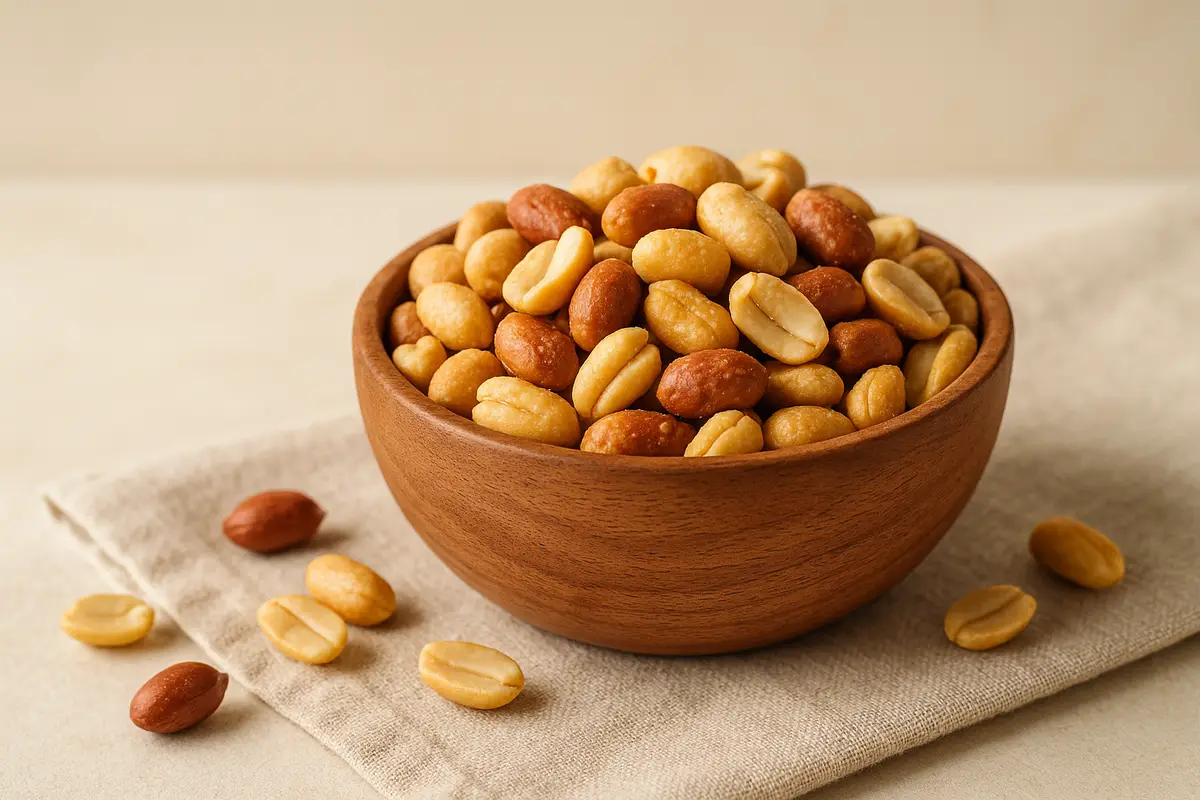Let’s start with the good news: yes, peanuts are generally safe for most pregnant women. The American College of Obstetricians and Gynecologists (ACOG) confirms that consuming peanuts during pregnancy is not only safe, but may actually reduce the risk of peanut allergies in children. Unless you’re allergic yourself, peanuts don’t pose a known threat to you or your baby.
Child Peanut Allergy Risk by Maternal Peanut Intake Frequency
This chart illustrates the correlation between how often mothers consume peanuts during pregnancy and the odds ratio of peanut allergy risk in their children. Higher intake frequency appears to be associated with significantly reduced allergy risk.
Why the shift in thinking? A couple of decades ago, many doctors advised pregnant women to avoid peanuts due to concerns about allergens. However, more recent research, including a landmark 2014 study published in JAMA Pediatrics, suggests that maternal consumption of peanuts may help develop immune tolerance in babies ⧉.
Of course, moderation is still key. A handful of peanuts (roughly 1 ounce or 28 grams) a few times a week can deliver important nutrients without overdoing it on calories or fats.
🥜 Smart Snacking With Peanuts: What to Pair Them With
Natural sugars + potassium = quick energy boost and muscle support.
Adds fiber and complex carbs to slow sugar release and sustain fullness.
Crunch + natural sweetness = fiber plus balance to peanut fats.
Low-calorie, crunchy and refreshing — makes a smart mid-day snack.
Protein + probiotics + healthy fat = gut-friendly combo.
Sweet and chewy contrast + iron support in one handy handful.
Source: iythealth.com
What Are the Nutritional Benefits of Peanuts During Pregnancy?
Peanuts might be small, but they’re packed with big-time nutrients — exactly what a mom-to-be needs. Here’s what one ounce (28g) or approximately 1 ounce of dry-roasted peanuts delivers:
| Nutrient | Amount (grams/ounces) | Benefit |
|---|---|---|
| Protein | 7g / 0.25 oz | Supports fetal tissue development |
| Folate | 68mcg | Crucial for neural tube development |
| Magnesium | 50mg | Helps prevent preterm labor |
| Niacin (B3) | 4.2mg | Supports energy production |
| Healthy fats | 14g / 0.5 oz | Boosts baby’s brain development |
| Fiber | 2.4g / 0.08 oz | Aids digestion and prevents constipation |
They also contain resveratrol, an antioxidant that may support brain and cardiovascular development in utero ⧉.
Reyus Mammadli, medical consultant, recommends adding peanuts to a balanced pregnancy diet as a cost-effective, nutrient-rich source of plant-based protein.
🌰 Peanuts vs Other Nuts During Pregnancy
- Protein: 7g
- Folate: ★★★★
- Magnesium: ★★★★
- Average Price: $0.20/oz
- Low in omega-3
- Risk of aflatoxins (if stored poorly)
- Protein: 6g
- Folate: ★★
- Magnesium: ★★★★★
- Average Price: $0.50/oz
- High in vitamin E
- Low risk of mold contamination
- Protein: 4g
- Folate: ★★
- Magnesium: ★★★
- Average Price: $0.60/oz
- Rich in antioxidants
- Higher monounsaturated fats
- Protein: 4g
- Folate: ★★
- Magnesium: ★★★
- Average Price: $0.55/oz
- Excellent source of omega-3
- Anti-inflammatory profile
- Protein: 5g
- Folate: ★★
- Magnesium: ★★★★
- Average Price: $0.45/oz
- Creamy texture, easy to digest
- Lower in fiber than peanuts
- Protein: 3g
- Folate: ★
- Magnesium: ★★
- Average Price: $0.60/oz
- Rich in polyphenols
- High calorie density
Source: iythealth.com
Can Eating Peanuts Help Prevent Allergies in Babies?
Turns out, eating peanuts while pregnant might actually help your baby avoid allergies down the line. According to a large observational study from the LEAP (Learning Early About Peanut Allergy) trial, early exposure to peanut proteins — including during gestation and breastfeeding — may train a baby’s immune system to recognize peanuts as safe ⧉.
This has been a game-changer in pediatric nutrition. In fact, the NIH now recommends early introduction of peanut-containing foods to high-risk infants. While that doesn’t mean chowing down on peanut butter daily is mandatory, moderate intake seems to be not just safe, but potentially protective.
One important caveat: this applies only if the mother herself does not have a peanut allergy. For allergic moms, peanuts remain off-limits, and you should consult your OB-GYN or allergist.
Are There Any Risks or Side Effects?
Like most good things, peanuts come with a few caveats. Here’s what to watch for:
- Allergies: If you have a known peanut allergy, strictly avoid all peanut products during pregnancy. Cross-contamination can also be risky.
- Aflatoxins: These are naturally occurring toxins from mold that can grow on peanuts stored improperly. While tightly regulated in the U.S., it’s best to buy from reputable brands ⧉.
- Excessive Salt: Salted peanuts can spike your sodium intake, contributing to swelling or high blood pressure. Choose unsalted or lightly salted options.
- Calorie Count: Peanuts are calorie-dense. One ounce = ~160 calories (670 kJ), so don’t overdo it.
A woman from Houston, TX, 32 years old and in her second trimester, reported persistent bloating and fatigue. A diet review showed she was eating peanut butter every morning and snacking on roasted peanuts twice a day. Her OB-GYN suggested cutting back to one serving daily, and her symptoms eased within a week.
Doctor Recommendations on Peanut Intake During Pregnancy (US, 2024)
This chart displays how U.S. doctors advised pregnant patients about peanut consumption in 2024. The majority either actively recommend or affirm its safety, while a minority suggest avoiding it altogether.
Best Ways to Include Peanuts in a Pregnancy Diet
Ready to make peanuts your pregnancy sidekick? Here are a few smart and tasty ways:
- Spread a tablespoon (16g) of peanut butter on whole-grain toast
- Blend into smoothies with banana and Greek yogurt
- Sprinkle chopped peanuts over oatmeal or yogurt bowls
- Add to stir-fries for crunch and flavor
Avoid raw peanuts due to possible bacterial contamination. Opt for roasted or boiled, and always check for added sugars or oils ⧉.
Peanut butter brands like Smucker’s Natural, Justin’s, and Teddie offer options with minimal ingredients and no hydrogenated oils. Reyus Mammadli also suggests rotating peanuts with other nuts (like almonds or cashews) to ensure a broader nutrient profile.
What About Peanut Oil and Peanut-Based Snacks?
Peanut oil, especially refined versions, contains no detectable peanut proteins and is generally considered safe even for those with peanut allergies. However, cold-pressed or unrefined peanut oils may retain proteins, so read labels carefully.
As for snacks, moderation is everything. Peanut-based granola bars, protein balls, or trail mixes can be healthy if you watch out for sugar overload. Stick to snacks with fewer than 8g of added sugar per serving and keep an eye on portion size ⧉.
Editorial Advice
Reyus Mammadli, medical consultant, emphasizes that peanuts can be a powerhouse addition to a pregnancy diet — if consumed thoughtfully. He recommends choosing natural, low-sodium options and keeping portions in check.
For moms-to-be without a history of allergies, peanuts are not only safe but possibly protective for your baby’s immune system. But like all things pregnancy-related, the key is balance.
Helpful tip? Mix peanuts with raisins or chopped dried fruit for a DIY trail mix that hits the sweet-salty craving without processed junk. And always listen to your body: if peanuts cause digestive discomfort or fatigue, scale back and check in with your healthcare provider.
So go ahead, grab that peanut butter spoon — just maybe not the whole jar!
Pregnant Women Avoiding Peanuts Due to Allergy Concerns (2024)
The chart reveals how pregnant women responded to peanut consumption in 2024 due to allergy concerns. While a significant majority continued eating peanuts normally, a noticeable portion reported complete or partial avoidance.
Q&A: Peanuts and Pregnancy — Your Top Questions Answered
1. Can peanuts cause heartburn during pregnancy?
Yes, they can — especially if you’re already prone to reflux. Peanuts are high in fat, which can slow digestion and relax the lower esophageal sphincter. Think of your stomach like a balloon — fatty foods can add more “air,” increasing pressure and pushing acid up. If heartburn hits, try switching to smaller portions or eating them earlier in the day.
2. Is peanut butter better than whole peanuts during pregnancy?
Not necessarily better, just different. Peanut butter is easier to digest and convenient, especially if chewing becomes uncomfortable (hello, third trimester!). But whole peanuts provide more fiber and crunch. Go with what feels good in your body — just avoid sugary or hydrogenated versions.
3. Can I eat peanuts daily while pregnant?
Sure — if you stick to small portions. A tablespoon of peanut butter or a small handful of peanuts (about 1 oz / 28g) daily is usually fine. Think of it like wearing comfy shoes: great in moderation, but too much of anything will wear you out.
4. Are boiled peanuts safer or healthier than roasted?
Boiled peanuts are lower in fat and sodium if prepared without salt, and they retain more antioxidants. They also have a softer texture, which some pregnant women find easier to digest. It’s like the difference between popcorn and oatmeal — both great, just depends on what your body prefers.
5. Can peanuts affect my baby’s taste preferences later on?
Surprisingly, yes. Studies suggest that what you eat during pregnancy can influence your baby’s flavor preferences after birth. So if you’re munching on peanuts now, you might be raising a future peanut lover.
6. Do peanuts interact with prenatal vitamins or iron supplements?
Peanuts don’t interfere directly, but they’re high in phosphorus, which competes with calcium absorption. If your prenatal includes calcium, try spacing it a few hours apart from your peanut snack — kind of like keeping two strong-willed toddlers from arguing at the same table.
7. Are flavored peanuts (honey-roasted, spicy) okay during pregnancy?
In moderation, yes. But many flavored peanuts come with added sugars, sodium, or artificial additives. Check labels carefully. It’s like dressing your salad — a little balsamic? Great. Drowning it in ranch? Maybe not.
8. Can I eat peanuts if I have gestational diabetes?
Yes, and they may actually help. Peanuts have a low glycemic index and provide protein and fat that help stabilize blood sugar. Just be mindful of portions — a small serving goes a long way. Pair them with high-fiber carbs for even better results.
9. Do peanuts help with pregnancy fatigue?
They can! Thanks to their combo of protein, healthy fats, and B vitamins (especially niacin), peanuts offer sustained energy. It’s not like a triple espresso shot — more like a steady power bank that keeps your battery from draining too fast.
If you have more questions or unique health concerns, always loop in your OB-GYN or dietitian. Everyone’s body — and baby — is a little different.
About the Author
Reyus Mammadli is the author of this health blog since 2008. With a background in medical and biotechnical devices, he has over 15 years of experience working with medical literature and expert guidelines from WHO, CDC, Mayo Clinic, and others. His goal is to present clear, accurate health information for everyday readers — not as a substitute for medical advice.







